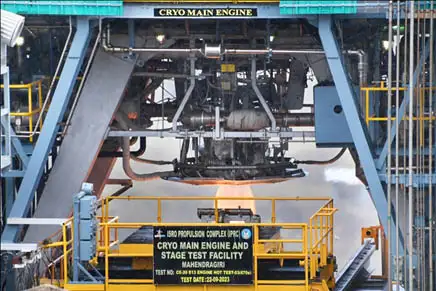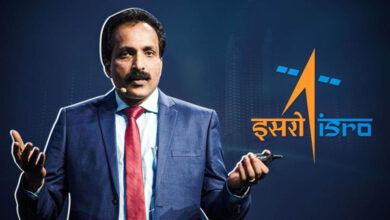ISRO Successfully Fires Engine that will carry Indian Vyomanauts into Space
- This engine has already proven its reliability and efficiency in six consecutive LVM3 missions, ISRO is upgrading the CE20 engine
Bangalore, September 25. ISRO successfully completed the CE20 E13 engine hot test for the Gaganyaan qualification and 22-tonne thrust qualification. The engine developed by the Liquid Propulsion Systems Centre (LPSC), Valiamala was tested at ISRO Propulsion Complex (IPRC), Mahendragiri on September 22, 2023.

The CE20 engine is a vital component, serving as the powerhouse of the Cryogenic Upper Stage (CUS) responsible for propelling the upper stage (C25) of the LVM3 vehicle. It has demonstrated its capability by successfully operating at a thrust level of 19 tonnes in six successive LVM3 missions, including the Chandrayaan-2, Chandrayaan-3, and two commercial OneWeb missions.
To enhance the payload capacity of the LVM3 vehicle, ISRO is upgrading the CE20 engine. The upper cryogenic stage is being transformed into the C32 stage with increased propellant loading capacity, and the engine is being modified to operate at a higher thrust level of 22 tonnes.
To ensure the engine’s readiness for critical missions, a series of ground hot tests were deemed necessary. The CE20 engine hardware referred to as E13 was selected for both Gaganyaan qualification and 22-tonne thrust level operations.
The journey to achieving a 22-tonne thrust capability began with E13 HT-01, a test focused on engine tuning, successfully conducted for a 50-second duration.
This initial test set the stage for the upcoming trials. E13 HT-02 marked a significant milestone, conducted on August 30, 2023, with the engine operating flawlessly for an impressive 720 seconds. This test demonstrated the engine’s reliability and stability.
The third hot test, E13 HT-03, was the pivotal moment in completing the CE20 engine qualification for the Gaganyaan program. On September 22, 2023, this test was conducted at the state-of-the-art test facility located at IPRC, Mahendragiri.
During this test, the CE20 engine operated at the coveted 22-tonne thrust level for a duration of 670 seconds. Both the engine and the testing facility performed flawlessly, meeting all the performance parameters.
The successful completion of E13 HT-03 signifies the culmination of rigorous testing and the readiness of the CE20 engine for the Gaganyaan program. With all the necessary tests completed, the CE20 engine is now poised for the demanding requirements of the Gaganyaan mission and future endeavours.
The CE20 engine, developed by the Liquid Propulsion Systems Centre (LPSC) in Valiamala, is a critical component of the Cryogenic Upper Stage (CUS) that powers the upper stage (C25) of the LVM3 vehicle.
This engine has already proven its reliability and efficiency in six consecutive LVM3 missions, including the Chandrayaan-2, Chandrayaan-3, and two commercial OneWeb missions.
In an effort to increase the payload capacity of the LVM3 vehicle, ISRO is upgrading the CE20 engine. The upper cryogenic stage is being transformed into the C32 stage with an enhanced propellant loading capacity.
Simultaneously, modifications are being made to the engine to operate at a higher thrust level of 22 tonnes. To ensure the engine’s readiness for these critical missions, a series of ground hot tests were deemed necessary.





